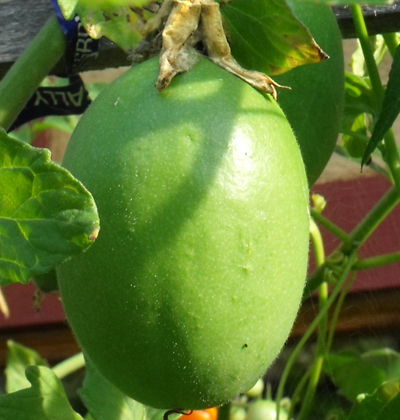Passionflower — it’s one of the most beautiful wild flowers you’ll ever see in Western North Carolina. Wispy lavender tendrils spike out on top of purple/white petals. Complex layers of ovaries, receptacle, stigmas and anthers are marked with all manner of spots and stripes in the most amazing colors, layering the inner workings of this stupendous flower. It’s almost otherworldly, ethereal, and reminiscent of fairy tales.
Passionflower is a vine that grows up to 20 feet in length, can be found on forest edges and in open places all over our area, and is often considered a common weed. The passion fruit, often called a “maypop” in the Southeast, is round or oblong and the size of a large chicken egg. Green or green/yellow, the fruit is filled with seeds surrounded by pulp. I know old timers who make it into jelly or syrup. And it’s been said that the Cherokee make a thickened beverage from the pulp.

The Passiflora genus consists of more than 500 species (with Old and New World passionflowers classified differently), nine of which are native to the United States. In our area, they are subtropical but hardy, which allows them to come back year after year.
The passionflowers are best pollinated by larger insects and small birds such as bumble bees, wasps, bats and hummingbirds. I often wonder if they get drunk and sedated by this plant. Or at the very least seduced.
One of my very favorite things about passionflower is how strongly it represents cooperation and interdependency in the natural world. According to Stephen Buhner in his book, The Lost Language of Plants, “Heliconius butterflies lay their eggs on the plants and act as passionflowers’ primary pollinators. And while the 45 species of Heliconius butterflies each specialize in a particular type of passionflower, the passionflowers intentionally limit their own range of growth. There are never more than 10 different species growing in any area. And though similar leaf shapes exist among the scores of passionflower species, none of those then species will have similar leaves. Each passionflower in that area uses different chemical and visual (leaf shape) cues for its own butterfly species.”
Despite the name, which refers to the Passion of Christ — around which symbolism within the flower abounds — passionflower is a very calming herb. It’s considered a “nervine” that acts to relax and restore aspects of the nervous system. It has been known to have a positive affect on tension, sleep disorders, headaches, anxiety, and restlessness. The leaves and flowers are collected to tincture or dry for tea in June and July.
We’re lucky to have this weed in our area for the beauty alone. Most visitors to my farm, including children, spend more time remarking on the amazing purple flower that grows wild than they do on the cultivated plants right nearby. I consider it a dear friend and hope to learn, firsthand, more of its benefits over time.
Lee Warren is a homesteader, herbalist, writer and the manager of Imani Farm, a pasture-based cooperative farm at Earthaven Ecovillage. She is also a co-founder of the Village Terraces CoHousing Neighborhood and the Program Coordinator for the Southeast Women’s Herbal Conference. For more information on the 8th annual event, visit sewisewomen.com. (sewisewomen.com).




I was mowing my fields and saw a lot of this flower. As I got deeper, I found dozens of the passion fruit pods with seeds. Too bad I didn’t know what they were before I cut.